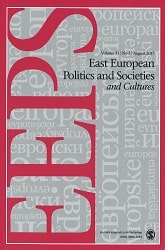The Theory and Practice of Plebiscitary Leadership: Weber and the Orbán regime
The Theory and Practice of Plebiscitary Leadership: Weber and the Orbán regime
Author(s): András KörösényiSubject(s): Political Philosophy, Government/Political systems, Political behavior, Politics and communication, Politics and society
Published by: SAGE Publications Ltd
Keywords: political leadership; charisma; plebiscitary leader democracy; Viktor Orbán; Max Weber;
Summary/Abstract: Most political science interpretations of the post-2010 Orbán regime have been written either within the framework of populism or in the democratization paradigm. We have learned much from these papers about Hungary’s drift in an authoritarian direction, but they also have drawbacks. This article aims to fill the gap between these two approaches and offers a theoretical framework to analyze the impact of populism and other trends of contemporary politics (like de-alignment, growing electoral volatility, citizens’ disengagement, personalization, legitimacy problems, the decline of party membership and partisanship, the mediatization of politics, etc.) on the political regime. It argues that these trends add up to an authority and regime type that can be conceptualized by Weber’s concept of plebiscitary leader democracy (PLD). PLD forms a new hybrid regime type that differs from comparative authoritarianism and other hybrid regime types known from the literature in three respects. First, PLD is less about institutional framework and procedures than about the sources of legitimacy; second, it serves better to understand how the regime works than measuring its distance from liberal democracy; third, it is an ideal type that aims to reveal the endogenous logic of democracy that generates authoritarian elements of the regime. The article also demonstrates the suitability of the concept of PLD for empirical research through presenting a structured case study of the Orbán regime. The PLD model enables us to reveal the endogenous logic of the Orbán regime and the impact of populist governance on it.
Journal: East European Politics and Societies
- Issue Year: 33/2019
- Issue No: 02
- Page Range: 280-301
- Page Count: 22
- Language: English
- Content File-PDF

